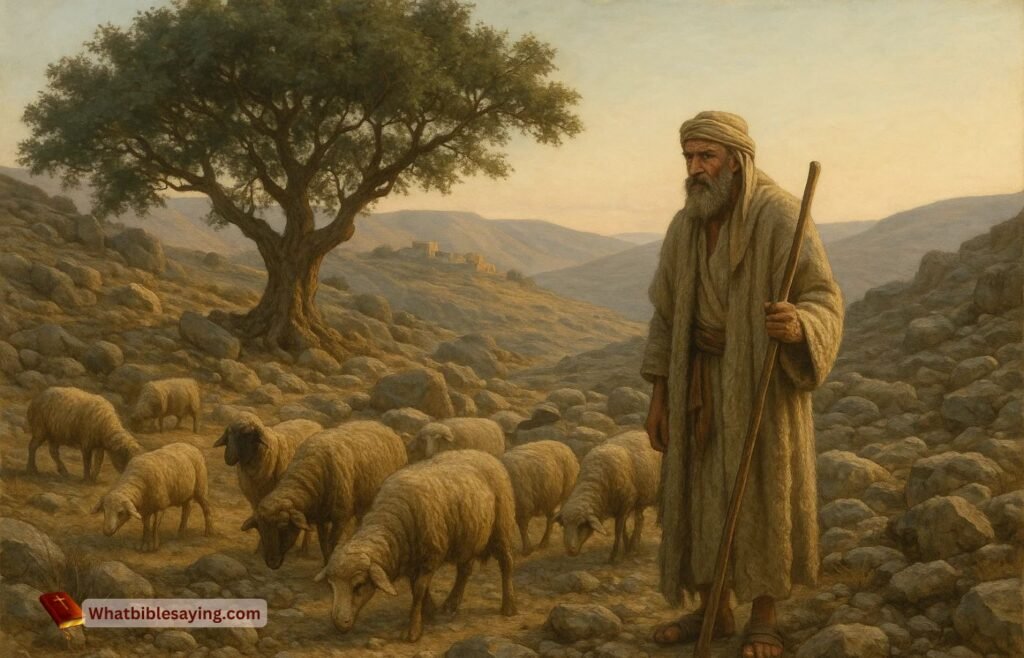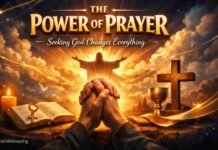 Most of us picture prophets as men cloaked in mystery, standing on mountaintops, delivering thunderous messages from heaven. But what if I told you that one of the boldest prophets in the Bible Amos wasn’t a priest, scribe, or scholar? He didn’t grow up in the temple courts or sit at the feet of great rabbis. No, Amos was a working man. A man with dirt under his nails, calloused hands, and a daily routine rooted in nature and labor.
Most of us picture prophets as men cloaked in mystery, standing on mountaintops, delivering thunderous messages from heaven. But what if I told you that one of the boldest prophets in the Bible Amos wasn’t a priest, scribe, or scholar? He didn’t grow up in the temple courts or sit at the feet of great rabbis. No, Amos was a working man. A man with dirt under his nails, calloused hands, and a daily routine rooted in nature and labor.
So, what was Amos’ occupation in the Bible before he became a prophet? Let’s walk through his story together.
Who Was Amos in the Bible?
Amos lived around 760–750 BC, during the reigns of King Uzziah of Judah and King Jeroboam II of Israel. He came from a small town called Tekoa, located south of Jerusalem in the kingdom of Judah. Although he was from the southern kingdom, God sent him to prophesy in the northern kingdom of Israel, which made his mission even more uncomfortable and courageous.
You can find his story and powerful messages in the Book of Amos, one of the twelve “Minor Prophets” in the Old Testament. But don’t let the term “minor” fool you his words were bold, direct, and deeply relevant.
What Did the Prophet Amos Do for a Living?
Before Amos ever opened his mouth to speak for God, he was a shepherd and a dresser of sycamore fig trees. That might sound simple on the surface, but both jobs had meaning and challenges of their own.
Let’s break it down.
1. He Was a Shepherd
In Amos 1:1, the Bible says:
“The words of Amos, who was among the shepherds of Tekoa…”
Now, this wasn’t just someone who watched a few sheep now and then. The Hebrew word used here, noked, suggests a sheep breeder or manager not just a lowly herdsman, but someone more established in the field.
So, Amos likely had deep knowledge of livestock, their care, breeding patterns, and health. He may have worked hard under the sun, traveling long distances to find pasture, and protecting his flock from predators. In biblical culture, shepherds were known for their toughness, patience, and watchfulness qualities that God often sought in His prophets.
2. He Was a Dresser of Sycamore-Fig Trees
In Amos 7:14, Amos describes himself in his own words:
“I was neither a prophet nor the son of a prophet, but I was a shepherd, and I also took care of sycamore-fig trees.” (NIV)
The sycamore-fig was a fruit common in warmer, lower regions of Judah. These fruits weren’t as prized as other figs, but they fed the poor and sustained entire communities.
Dressing a sycamore fig tree meant piercing the fruit to help it ripen and prevent insect damage. It was precise, patient work. Not glamorous but essential. This tells us something deeply important about Amos:
He worked with his hands, lived among common people, and understood the daily struggles of ordinary families. He didn’t come from wealth or religious status. He came from the fields.
What Kind of Farmer Was Amos?
To put it simply, Amos was a multi-skilled agricultural worker someone we might today call a small business owner, managing both animals and crops.
As a shepherd, he dealt with life, death, nurturing, and danger.
As a fig dresser, he had to know the seasons, handle delicate fruit, and perform labor that was thankless but necessary.
In short: Amos understood the earth, the economy, and the emotion of everyday life.
How Was Amos Called to Be a Prophet?
Amos never planned on becoming a prophet. He wasn’t raised in a priestly family, nor did he train in the schools of the prophets. He wasn’t seeking the spotlight.
But God chose him.
In Amos 7:15, he says:
“But the Lord took me from tending the flock and said to me, ‘Go, prophesy to my people Israel.’”
This moment was radical. Imagine a quiet farmer being told to go stand before a corrupt king, wealthy elites, and priests in Bethel, calling out injustice and warning of judgment. But that’s exactly what Amos did.
He left the field and stepped into the fire armed only with truth.
What Does Amos Do in the Bible?
The Book of Amos is a powerful collection of sermons, visions, and warnings. Here’s a quick overview of what Amos does in the Bible:
He denounces the surrounding nations for violence and cruelty (Amos 1–2)
He confronts Israel for their oppression of the poor, hypocrisy in worship, and pride (Amos 3–6)
He shares a series of visions showing judgment and future hope (Amos 7–9)
But through it all, Amos isn’t just angry he’s mourning. His heart aches over injustice, over religion that’s lost its soul, over people who think their wealth means God’s approval.
One of his most famous lines captures it perfectly:
“Let justice roll on like a river, righteousness like a never-failing stream!” (Amos 5:24)
What Is the Main Message of the Book of Amos?
Amos delivers one clear message: God cares about justice.
He tells Israel that religious rituals mean nothing if society is corrupt. God isn’t impressed by songs and offerings when people are trampling the poor, taking bribes, and selling the innocent for silver.
In a world obsessed with appearance, Amos points to the heart.
His core messages include:
Justice matters more than ritual
God holds all nations accountable
Complacency in prosperity is dangerous
The poor are not invisible to God
True worship requires right living
And yet, despite all the warnings, Amos ends on a note of hope. In Amos 9:11–15, God promises to restore the fallen tent of David and bless His people again.
How Is the Book of Amos Relevant Today?
You might be surprised how a book written nearly 3,000 years ago still feels fresh.
Here’s how Amos speaks into our modern world:
We see wealth and injustice side by side just like in Israel.
Many today focus on religion without compassion, like those in Amos’ time.
Amos reminds us that God notices the suffering of the powerless.
He calls us to live with integrity, not just worship with words.
If you’ve ever felt tired of surface-level religion… If you’ve ever seen unfairness and wondered where God is… Amos is for you.
How Did Amos Die?
The Bible doesn’t directly tell us how Amos died. Jewish tradition and later historical writings suggest he may have been persecuted or even killed for his bold prophecies, but that’s not confirmed in Scripture.
Some early sources claim he was beaten by a priest in Bethel and later died from his injuries, but again this is tradition, not biblical fact.
What we do know is that Amos paid a high personal cost for speaking the truth.
When Was Amos Born, and How Old Was He When He Died?
The Bible doesn’t give exact dates, but scholars estimate that Amos was born around 800 BC. His prophetic ministry likely took place around 760–750 BC, during a time of great wealth and corruption in Israel.
As for his age, we can only guess. But based on his active occupation and ability to travel from Judah to Israel, some estimate he may have been in his 30s or 40s when he prophesied.
Who Is Amos’ Father?
Unlike other prophets such as Jeremiah or Isaiah, Amos doesn’t mention his father. This could be because his background wasn’t religious or noble, and his calling came directly from God, not family heritage.
In Amos 7:14, he makes it clear:
“I was not a prophet nor the son of a prophet…”
He was just a man with a message. And maybe that’s the point.
Final Words: A Farmer With a Fire in His Soul
Amos never asked to be famous. He wasn’t born into leadership or trained in theology. He was a farmer, a worker, a nobody by the world’s standards.
But when God needed someone to speak the truth someone who wouldn’t be swayed by money or power He called a man from Tekoa.
And that man said yes.
So next time you feel small, unqualified, or ordinary, remember Amos. The shepherd who became a voice. The fig dresser who dressed wounds with words. The man who stood alone and stood firm.
Because sometimes, the loudest voices for justice come from the quietest fields.












